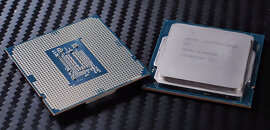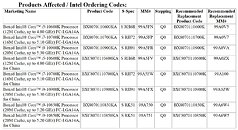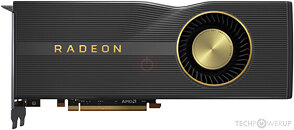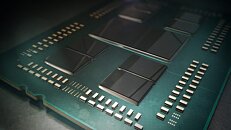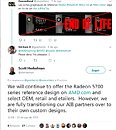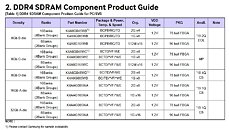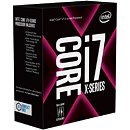Apr 18th, 2025 15:13 EDT
change timezone
Latest GPU Drivers
New Forum Posts
- GPU Pricing and Performance (15)
- What are you playing? (23396)
- TPU's Nostalgic Hardware Club (20256)
- Can Intel recover in DYI market anytime soon? (7)
- Spoofer Modified SMBIOS/BIOS – Need Help Restoring Original Motherboard Info (TUF GAMING B550-PLUS WiFi II) (2)
- Tried installing 576.02 - installer window disappears (20)
- Place your bets, what node will rtx 6000/RDNA 5(UDNA 1?) use (6)
- RX 9000 series GPU Owners Club (392)
- GPU Database (300)
- Drives fail to work with Rufus Windows TO GO (2)
Popular Reviews
- ASUS GeForce RTX 5060 Ti TUF OC 16 GB Review
- NVIDIA GeForce RTX 5060 Ti PCI-Express x8 Scaling
- Palit GeForce RTX 5060 Ti Infinity 3 16 GB Review
- G.SKILL Trident Z5 NEO RGB DDR5-6000 32 GB CL26 Review - AMD EXPO
- ASUS GeForce RTX 5060 Ti Prime OC 16 GB Review
- Teevolution Terra Pro Review
- MSI GeForce RTX 5060 Ti Gaming OC 16 GB Review
- Zotac GeForce RTX 5060 Ti AMP 16 GB Review
- MSI GeForce RTX 5060 Ti Gaming Trio OC 16 GB Review
- ASUS GeForce RTX 5080 TUF OC Review
Controversial News Posts
- NVIDIA GeForce RTX 5060 Ti 16 GB SKU Likely Launching at $499, According to Supply Chain Leak (182)
- NVIDIA Sends MSRP Numbers to Partners: GeForce RTX 5060 Ti 8 GB at $379, RTX 5060 Ti 16 GB at $429 (127)
- Nintendo Confirms That Switch 2 Joy-Cons Will Not Utilize Hall Effect Stick Technology (105)
- Over 200,000 Sold Radeon RX 9070 and RX 9070 XT GPUs? AMD Says No Number was Given (100)
- Nintendo Switch 2 Launches June 5 at $449.99 with New Hardware and Games (99)
- NVIDIA Launches GeForce RTX 5060 Series, Beginning with RTX 5060 Ti This Week (98)
- Sony Increases the PS5 Pricing in EMEA and ANZ by Around 25 Percent (85)
- NVIDIA PhysX and Flow Made Fully Open-Source (77)
News Posts matching #EOL
Return to Keyword BrowsingMidnight Society Closing Down, Development of DEADROP Ends
Today we are announcing Midnight Society will be closing its doors after three incredible years, with an amazing team of over 55 developers contributing to our new IP DEADROP. We are actively seeking other game studios that would be interested in offering employment opportunities to our talented team members. If you know anyone who's hiring please forward this message to them or DM us for direct intros. We express our sincere gratitude to each and every one of our community members and deeply sorry we were unable to reach our ultimate goal.
Midnight Society was founded on the core principles of transparency and open development. From as early as the creation of the very first weapon, environment, and gameplay systems, we shipped playable builds of our games to our massive community of players. With the leadership of three industry veterans, the studio grew to over fifty AAA developers from the largest franchises in the world (Call of Duty, Halo and Fortnite), alongside hundreds of thousands of community members who signed up to play in-development Snapshots of our first game and provide crucial feedback for the team.
Midnight Society was founded on the core principles of transparency and open development. From as early as the creation of the very first weapon, environment, and gameplay systems, we shipped playable builds of our games to our massive community of players. With the leadership of three industry veterans, the studio grew to over fifty AAA developers from the largest franchises in the world (Call of Duty, Halo and Fortnite), alongside hundreds of thousands of community members who signed up to play in-development Snapshots of our first game and provide crucial feedback for the team.

AMD Retiring Radeon RX 6750 GRE 10 GB SKU According to Chinese Tipsters
AMD's Radeon RX 6750 GRE GPU is an (RDNA 2) Chinese market exclusive—Board Channels members reckon that this model is facing imminent discontinuation. The "GRE" affix denotes "Golden Rabbit Edition." Western graphics card enthusiasts will be familiar with this slightly odd moniker due to Radeon RX 7900 GRE-based (RDNA 3) cards heading to European and North American territories around early 2024. Sadly, this mid-to-high tier GPU is rumored to be reaching an end-of-life (EOL) phase—the latest speculation now points to Team Red's Radeon RX 6750 GRE being quietly withdrawn from China's PC hardware market.
Two Radeon RX 6750 GRE Navi 22-based SKUs—with 10 GB or 12 GB video memory configurations—were created specifically to fill a gap not occupied by AMD's Radeon RX 7600 XT model. The affordable-tier Golden Rabbit Editions are said to be highly popular with Chinese system integrators and budget-minded gamers, but Team Red and its board partners have (apparently) declared that the 10 GB variant is now discontinued. A Board Channel member posited that an "inventory digestion phase" is already underway, with an end date set in March. AIBs are reportedly waiting on "replacement plans from February to March." The Radeon RX 6750 GRE 12 GB variant is reported to be sticking around for the moment, but a new candidate could be appearing in the near future. VideoCardz believes that AMD is considering a rollout of the—not yet announced and oft-delayed—Radeon RX 7650 GRE as a potential modernized substitute.
Two Radeon RX 6750 GRE Navi 22-based SKUs—with 10 GB or 12 GB video memory configurations—were created specifically to fill a gap not occupied by AMD's Radeon RX 7600 XT model. The affordable-tier Golden Rabbit Editions are said to be highly popular with Chinese system integrators and budget-minded gamers, but Team Red and its board partners have (apparently) declared that the 10 GB variant is now discontinued. A Board Channel member posited that an "inventory digestion phase" is already underway, with an end date set in March. AIBs are reportedly waiting on "replacement plans from February to March." The Radeon RX 6750 GRE 12 GB variant is reported to be sticking around for the moment, but a new candidate could be appearing in the near future. VideoCardz believes that AMD is considering a rollout of the—not yet announced and oft-delayed—Radeon RX 7650 GRE as a potential modernized substitute.

Intel 12th Gen "Alder Lake" Mobile CPUs Face Retirement, HX-series Spared
Intel product change notification documents—published on January 6—have revealed the planned "End of Life" (EOL) phasing out of 12th Generation "Alder Lake" mobile processor models. Tom's Hardware has pored over the listed products/SKUs and concluded that the vast majority of Team Blue's mobile-oriented Alder Lake selection are destined for retirement. Team Blue's HX series is being kept alive for a little while longer. Two documents show differing "discontinuance timelines" for their respective inventories—including lower-end Celeron and Pentium Gold SKUs, as well as familiar higher-up Core i3, i5, i7, and i9 families. U, P, H and HK-affixed models are lined up for the chopping block.
Intel's 13th Generation "Raptor Lake" mobile processor selection—comprised of Core 100 (series 1) and Core 200 (series 2)—offers similar silicon makeup. Many equivalent alternatives to older generation "Alder Lake" chips reside here—Tom's Hardware presented a key example: "i5-1235U, which is designated for thin and lightweight laptops. OEMs can instead opt for the i5-1335U, the Core 5 120U, or the Core 5 220U, as they're just better bins of the 1235U on the same FCBGA1744 socket." A significant number of Alder Lake mobile SKUs will be available to OEMs for ordering up until 26 April, with final shipments heading out on 25 October. The rest have been assigned a July 25 order cut-off date, with final shipments scheduled on 26 January 2026.
Intel's 13th Generation "Raptor Lake" mobile processor selection—comprised of Core 100 (series 1) and Core 200 (series 2)—offers similar silicon makeup. Many equivalent alternatives to older generation "Alder Lake" chips reside here—Tom's Hardware presented a key example: "i5-1235U, which is designated for thin and lightweight laptops. OEMs can instead opt for the i5-1335U, the Core 5 120U, or the Core 5 220U, as they're just better bins of the 1235U on the same FCBGA1744 socket." A significant number of Alder Lake mobile SKUs will be available to OEMs for ordering up until 26 April, with final shipments heading out on 25 October. The rest have been assigned a July 25 order cut-off date, with final shipments scheduled on 26 January 2026.

AMD Radeon RX 7900 GRE China-Edition GPU Reaches End-of-Life
According to Tweakers, AMD's Radeon RX 7900 GRE graphics card has reached end-of-life status, as confirmed by multiple AMD board partners they have contacted. The announcement comes just months after the card's expansion into European markets following its initial 2023 exclusive launch in China. Tweakers report that the supply of the RX 7900 GRE is rapidly declining across retail channels. While ASUS models remain somewhat available, the manufacturer has informed Tweakers that deliveries are currently "limited." AMD has not responded to their multiple requests for comment regarding the discontinuation. The RX 7900 GRE offers compelling specifications that position it as a slightly scaled-down variant of the more premium RX 7900 XT.
Built on AMD's RDNA 3 architecture, the card features 80 CUs and 16 GB of GDDR6 memory and operates at a 260 W TDP. The timing of this discontinuation is particularly interesting as AMD prepares to unveil its next-generation RDNA 4-based Radeon RX 8000 series. Perhaps AMD is trying to flush out its remaining inventory to make room for its Radeon RX 8000 series GPUs, which should mainly target the middle-range of the next-generation GPU families, including competition like NVIDIA with "Blackwell" and Intel with "Battlemage." With the new card scheduled to appear during AMD's CES keynote on January 6 in Las Vegas, we have to wait and see what products AMD puts out before analyzing why AMD decided to EOL its Radeon RX 7900 GRE.
Built on AMD's RDNA 3 architecture, the card features 80 CUs and 16 GB of GDDR6 memory and operates at a 260 W TDP. The timing of this discontinuation is particularly interesting as AMD prepares to unveil its next-generation RDNA 4-based Radeon RX 8000 series. Perhaps AMD is trying to flush out its remaining inventory to make room for its Radeon RX 8000 series GPUs, which should mainly target the middle-range of the next-generation GPU families, including competition like NVIDIA with "Blackwell" and Intel with "Battlemage." With the new card scheduled to appear during AMD's CES keynote on January 6 in Las Vegas, we have to wait and see what products AMD puts out before analyzing why AMD decided to EOL its Radeon RX 7900 GRE.

Windows 11 Preview Build Removes WordPad
Microsoft quietly added WordPad to its "Deprecated features for Windows client" list last September—a short message stated that the popular bundled-in word processing application will: "no longer be updated and will be removed in a future release of Windows. We recommend Microsoft Word for rich text documents like.doc and.rtf and Windows Notepad for plain text documents like.txt." The aforementioned "future" version of their mainstream operating system appears to be the recently issued Windows 11 Insider Preview Build 26040 (through Canary Channel). Microsoft is pushing an AI feature enriched user experience—last week's Insider blog reveals that Voice Clarity is escaping its Surface family confines; the application no longer relies on NPU hardware.
According to Preview 26040's accompanying notes: "Starting with this build, the WordPad and People apps will no longer be installed after doing a clean install of the OS. In a future flight, WordPad will be removed in an upgrade. WordPad will not be reinstallable. WordPad is a deprecated Windows feature." Many journalists have pointed out that protest efforts could save WordPad from its deprecated fate—enough fuss was generated over Microsoft's proposed axing of MS Paint, to warrant a reversal and eventual AI-enrichment. A segment of the Windows userbase will welcome the upcoming dismissal of Cortana (already effective in the latest W11 preview)—their older personal productivity assistant is being pushed aside in favor of Windows Copilot.
According to Preview 26040's accompanying notes: "Starting with this build, the WordPad and People apps will no longer be installed after doing a clean install of the OS. In a future flight, WordPad will be removed in an upgrade. WordPad will not be reinstallable. WordPad is a deprecated Windows feature." Many journalists have pointed out that protest efforts could save WordPad from its deprecated fate—enough fuss was generated over Microsoft's proposed axing of MS Paint, to warrant a reversal and eventual AI-enrichment. A segment of the Windows userbase will welcome the upcoming dismissal of Cortana (already effective in the latest W11 preview)—their older personal productivity assistant is being pushed aside in favor of Windows Copilot.

AMD Discontinues Selection of Old Xilinx CPLD & FPGA Models
AMD has quietly issued a product discontinuation notice—their PDF document is dated January 1 2024—for a whole bunch of Xilinx Complex Programmable Logic Device (CLPD) and lower-end FPGA models. Team Red's opening statement on the matter reads: "AMD will be discontinuing XC9500XL, CoolRunner XPLA 3, CoolRunner II, Spartan II, and Spartan 3, 3A, 3AN, 3E, 3ADSP Commercial/ Industrial "XC" and Automotive "XA" Product Families due to declining run-rate and supplier sustainability reasons." The American multinational semiconductor inherited a large back catalog of programmable logic products once their acquisition of Xilinx was completed back in 2022.
Industry analysts believed that this takeover was mainly motivated by a desire to expand into FPGA territories, although Team Red indicated that it would carry on producing and supporting Xilinx's older CLPD products—for example, the Spartan 3 family debuted back in 2011, while a couple of the CoolRunner II parts on the list are of 2002 vintage. AMD's discontinuation notice provides details of Last Time Buy (LTB) final orders—the cut-off date for soon-to-be-axed devices appears to be June 29 2024.
Industry analysts believed that this takeover was mainly motivated by a desire to expand into FPGA territories, although Team Red indicated that it would carry on producing and supporting Xilinx's older CLPD products—for example, the Spartan 3 family debuted back in 2011, while a couple of the CoolRunner II parts on the list are of 2002 vintage. AMD's discontinuation notice provides details of Last Time Buy (LTB) final orders—the cut-off date for soon-to-be-axed devices appears to be June 29 2024.

Ubisoft to Decommission Online Services for Several Older Games in January 2024
Last year, we posted an article on decommissioning online services for some older games. Today we have an update for you, as some additional online services will be decommissioned across several platforms on January 25, 2024. Decommissioning such services for older games is not something we take lightly, but is a necessity as the technology that drove those services has grown obsolete.
Below, you can find a list of the games and platforms affected. For a detailed breakdown of the effects of this decommissioning, please refer to our updated self-help article. Rest assured that the decommissioning of online services will only affect certain online functionalities; if you purchased these games, you will still be able to play them.
Below, you can find a list of the games and platforms affected. For a detailed breakdown of the effects of this decommissioning, please refer to our updated self-help article. Rest assured that the decommissioning of online services will only affect certain online functionalities; if you purchased these games, you will still be able to play them.

Windows WordPad on the Microsoft Chopping Board
Microsoft has quietly added WordPad to their list of "Deprecated features for Windows client," as of September 1—this classic word processor application has been part of their operating systems stretching back in time to Windows 95—when it debuted as Microsoft Write's successor. The announcement stated: "WordPad is no longer being updated and will be removed in a future release of Windows. We recommend Microsoft Word for rich text documents like.doc and.rtf and Windows Notepad for plain text documents like.txt." Updates for the bundled rich-text editing program ceased following UI tweaks introduced around the Windows 8 era.
Microsoft presents two alternative paths for the near future—naturally, one involves a paid 365 subscription—you can opt for Word. An online version is available at no cost, but it involves registration (with MS) and only functions as a web app. Notepad is the next best free-to-use native word processor—it has been modernized with new features, albeit via Windows 11. HotHardware has hyped it up: "One major update that users have been asking for was recently added to Notepad, that being the ability to open multiple tabs within the same session. Future updates include an autosave feature and the ability to restore previously open tabs as well as unsaved content and edits across those open tabs." Microsoft will be adding a snipping tool at some point, with the introduction of a: "combined capture bar, making it easier to switch between capturing screenshots and screen recordings without having to open the app."
Microsoft presents two alternative paths for the near future—naturally, one involves a paid 365 subscription—you can opt for Word. An online version is available at no cost, but it involves registration (with MS) and only functions as a web app. Notepad is the next best free-to-use native word processor—it has been modernized with new features, albeit via Windows 11. HotHardware has hyped it up: "One major update that users have been asking for was recently added to Notepad, that being the ability to open multiple tabs within the same session. Future updates include an autosave feature and the ability to restore previously open tabs as well as unsaved content and edits across those open tabs." Microsoft will be adding a snipping tool at some point, with the introduction of a: "combined capture bar, making it easier to switch between capturing screenshots and screen recordings without having to open the app."

Intel Discontinues its NUC Product Range
Intel has informed ecosystem partners about the cessation of direct investment in its Next Unit of Compute (NUC) business—ServeTheHome was the first outlet to report on this development earlier today, following industry rumors cropping up on Monday. Intel has been pulling back on non-core business operations—back in April its server building operation was sold to MiTAC. Today's announcement signals Team Blue's exit from the PC building industry—their (internally manufactured) NUC products included SFF computers, kits, laptop reference systems and boards.
Intel sent an official statement to HardwareLuxx (translated from German): "We have decided to stop direct investment in the Next Unit of Compute (NUC) Business and pivot our strategy to enable our ecosystem partners to continue NUC innovation and growth. This decision will not impact the remainder of Intel's Client Computing Group (CCG) or Network and Edge Computing (NEX) businesses. Furthermore, we are working with our partners and customers to ensure a smooth transition and fulfillment of all our current commitments."
Intel sent an official statement to HardwareLuxx (translated from German): "We have decided to stop direct investment in the Next Unit of Compute (NUC) Business and pivot our strategy to enable our ecosystem partners to continue NUC innovation and growth. This decision will not impact the remainder of Intel's Client Computing Group (CCG) or Network and Edge Computing (NEX) businesses. Furthermore, we are working with our partners and customers to ensure a smooth transition and fulfillment of all our current commitments."

Activision Ending Service for Call of Duty: Warzone Caldera in September
As of September 21, 2023, Call of Duty: Warzone Caldera will shut down, as our teams focus on future Call of Duty content including the current Warzone free-to-play experience. We all have had incredible Warzone experiences across the Call of Duty franchise since its first launch, including those in Warzone Caldera. For those players who haven't jumped over to the current Warzone activities, expect a vast number of gameplay choices across three Battle Royale maps (including Season 04's new map Vondel), as well as Ranked Play, the DMZ Beta featuring five different Extraction Zones, BlackCell offerings, and more.
Players should prepare for even more Warzone content across consoles and PC, as well as a new era of Battle Royale on the go with the launch of Call of Duty: Warzone Mobile, which includes a shared Battle Pass and cross-progression. The Call of Duty team and Studios look forward to sharing more details soon. Regarding purchased content in Warzone Caldera - from Modern Warfare (2019), Black Ops Cold War, or Vanguard - that will continue to be accessible in those specific games.
Players should prepare for even more Warzone content across consoles and PC, as well as a new era of Battle Royale on the go with the launch of Call of Duty: Warzone Mobile, which includes a shared Battle Pass and cross-progression. The Call of Duty team and Studios look forward to sharing more details soon. Regarding purchased content in Warzone Caldera - from Modern Warfare (2019), Black Ops Cold War, or Vanguard - that will continue to be accessible in those specific games.

Intel Discontinues the 16GB Limited Edition of Arc A770
Intel issued a product change notification (PCN), announcing the discontinuation of the reference-design Arc A770 16 GB Limited Edition graphics card. The product is now marked end-of-life (EOL) from Intel's end. What this means is that retailers cannot order more of it from Intel. The Arc A770 has 8 GB as its standard video memory size, and in its reference spec, uses 8 GB of 16 Gbps-rated GDDR6 memory across a 256-bit wide memory bus. The first-party A770 Limited Edition card comes with 16 GB of faster 17.5 Gbps memory. Memory aside, both the A770 Limited Edition, and custom-design A770 graphics cards have the same GPU core-configuration.

Intel 11th Gen Tiger Lake-U CPUs Discontinued
Intel is in the process of discontinuing its eleventh generation Tiger Lake-U CPU lineup according to the company's own Product Change Notification (PCN) system. Team Blue's database points to the final batch of (x86 Willow Cove architecture) processors getting shipped out on December 29, with an October 2023 cutoff point for last orders. These 11th Gen Core units (with Iris Xe iGPUs) have been part of laptops, mobile devices and small-form-factor (SFF) systems since launching in 2020. Intel started the end-of-life (EOL) for more powerful variants (some Tiger Lake-H models and the entire Tiger Lake-B range) back in April of this year.
Tiger Lake was an early example of a 10 nm++ SuperFin product, with improved production yields leading to the creation of high performance gaming laptop CPUs (the aforementioned H and B models), alongside the basic low power U-series. Intel has also added Tiger Lake-H35 models to the discontinuance list (totaling 42 models), and a trio of 500-series chipsets that were designed to accommodate their embedded 11th generation processor family: RM590E, HM570E and QM580E. Plenty of Tiger Lake-based stock still exists on the market, but Intel will be very keen to clear that excess - in favor of making way for its 12th and 13th generation product ranges.
Tiger Lake was an early example of a 10 nm++ SuperFin product, with improved production yields leading to the creation of high performance gaming laptop CPUs (the aforementioned H and B models), alongside the basic low power U-series. Intel has also added Tiger Lake-H35 models to the discontinuance list (totaling 42 models), and a trio of 500-series chipsets that were designed to accommodate their embedded 11th generation processor family: RM590E, HM570E and QM580E. Plenty of Tiger Lake-based stock still exists on the market, but Intel will be very keen to clear that excess - in favor of making way for its 12th and 13th generation product ranges.

Apple Ending Support for Thunderbolt Display and 1st Gen iPad Air
Apple hardware hoarders do exist - a friend told me that he'd only just replaced a 2013 vintage 15-inch Retina MacBook Pro this month - these folks continue to enjoy repairs or miscellaneous services at Apple Stores and authorized service providers on some products. Unfortunately there is potential bad news for preservationist owners of the original Thunderbolt Display and the first generation iPad Air tablet - a leaked internal memo suggests that Apple has decided to add these two antiques to their end-of-life (EOL) device list, according to MacRumors. Apple's Thunderbolt Display was released back in the summer of 2011, the company boasted that its fancy 27-inch 1440p monitor was the world's first display with Thunderbolt I/O technology (at the time), the asking price was $999. Alongside its requisite Thunderbolt I/O port (designed to connect to compatible Mac Notebooks), the monitor had a number of other spiffy features including an in-built 720p webcam, three USB 2.0 ports, a FireWire 800 port and a Gigabit Ethernet port.
Apple stopped making the Thunderbolt Display in 2016, and customers had to wait another six years for a successor to turn up - the Studio Display launched alongside the Mac Studio in March 2022. The original (1st gen) iPad Air was released on November 1 in 2013. It was the first entry in the iPad tablet family to feature a thinner design - its standard (non-Air) predecessors were a bit chunkier in comparison. It was discontinued in March of 2016, and Apple has so far released five generations of iPad Air products - last year's model debuted with the ARM-based M1 chipset.
Apple stopped making the Thunderbolt Display in 2016, and customers had to wait another six years for a successor to turn up - the Studio Display launched alongside the Mac Studio in March 2022. The original (1st gen) iPad Air was released on November 1 in 2013. It was the first entry in the iPad tablet family to feature a thinner design - its standard (non-Air) predecessors were a bit chunkier in comparison. It was discontinued in March of 2016, and Apple has so far released five generations of iPad Air products - last year's model debuted with the ARM-based M1 chipset.
43rd Symposium on VLSI Technology & Circuits to Focus on Multi-chiplet Devices and Packaging Innovations as Moore's Law Buckles
The 43rd edition of the Symposium on VLSI Technology & Circuits, held annually in Kyoto Japan, is charting the way forward for the devices of the future. Held between June 11-16, 2023, this year's symposium will see structured presentations, Q&A, and discussions on some of the biggest technological developments in the logic chip world. The lead (plenary) sessions drop a major hint on the way the wind is blowing. Leadning from the front is an address by Suraya Bhattacharya, Director, System-in-Package, A*STAR, IME, on "Multi-Chiplet Heterogeneous Integration Packaging for Semiconductor System Scaling."
Companies such as AMD and Intel read the tea-leaves, that Moore's Law is buckling, and it's no longer economically feasible to build large monolithic processors at the kind of prices they commanded a decade ago. This has caused companies to ration their allocation of the latest foundry node to only the specific components of their chip design that benefit the most from the latest node, and identify components that don't benefit as much, and disintegrate them into separate dies build on older foundry nodes, which are then connected through innovative packaging technologies.
Companies such as AMD and Intel read the tea-leaves, that Moore's Law is buckling, and it's no longer economically feasible to build large monolithic processors at the kind of prices they commanded a decade ago. This has caused companies to ration their allocation of the latest foundry node to only the specific components of their chip design that benefit the most from the latest node, and identify components that don't benefit as much, and disintegrate them into separate dies build on older foundry nodes, which are then connected through innovative packaging technologies.

Intel 11th Gen Core "Rocket Lake" Processors Now EOL and Discontinued in Latest PCN
Intel 11th Gen Core "Rocket Lake" desktop processors in the Socket LGA1200 package, the first Intel desktop processor generation in five years to offer an IPC increase, has been marked EOL (end of life) and is formally discontinued from the company's product stack. This comes in the latest product-change notification (PCN), dated February 6, 2023, and is consistent with a normal product lifecycle for Intel. A product marked EOL and discontinued can no longer be ordered from Intel, although there are still plenty of 11th Gen Core processors in the market, which Intel will fully honor product warranties for; so those on entry-level 11th Gen processors such as the i5-11400 still have a certain amount of upgrade headroom to the 8-core i7-11700/K or the faster i9-11900/K. The PCN covers pretty much the entire 11th Gen Core desktop product stack.

AMD Releases Adrenalin 22.6.1 Legacy Software for Older GPUs
AMD today released AMD Software Adrenalin 22.6.1 Legacy. This is a special branch of AMD software designed for older GPUs based on the Graphics CoreNext architecture—Fury series, 300 series, 200 series, and HD 7000/8000 series. The driver only supports Windows 10 64-bit, there's no official support for Windows 11. Legacy branch drivers correct outstanding bugs, security vulnerabilities, and some other software-level updates, but the company doesn't advertise any new game-specific optimizations. This is probably because these GPU generations fall outside the minimum system requirements of the latest games. Still, if you'd like to reminisce with an older GPU you have lying around, or want to build a period-specific project (2010 to 2015); here's your chance. If however, you're looking for the regular Adrenalin 22.6.1 WHQL drivers for the latest GPUs, check out this page.
DOWNLOAD: AMD Software Adrenalin 22.6.1 Legacy
DOWNLOAD: AMD Software Adrenalin 22.6.1 Legacy

QNAP Extends Security Updates for EOL Products
QNAP Systems, Inc., today announced that it has extended the end date of Technical Support and Security Updates for some End of Life (EOL) models, helping users to defend against evolving security threats and allowing users to have more time to implement device upgrades. EOL models may lack computational capabilities, be short on operational memory, be unable to receive up-to-date component drivers, or possess other technical constraints or deprecated technology.
Due to these reasons, QNAP normally maintains security updates for 4 years after a product passes its EOL date. As a special effort to help users protect their devices from today's security threats, QNAP has extended security updates for some EOL models till October 2022. The support for EOL models will be limited to high or critical security updates until the end of Technical Support and Security Updates date. For users to protect data from security threats growing along with the technology, QNAP recommends that users do not connect the EOL device to the internet.
Due to these reasons, QNAP normally maintains security updates for 4 years after a product passes its EOL date. As a special effort to help users protect their devices from today's security threats, QNAP has extended security updates for some EOL models till October 2022. The support for EOL models will be limited to high or critical security updates until the end of Technical Support and Security Updates date. For users to protect data from security threats growing along with the technology, QNAP recommends that users do not connect the EOL device to the internet.

Intel Kills Extended Warranty Program for Overclocking
Some time ago, Intel has introduced the Performance Tuning Protection Plan (PTPP), which was used as a warranty for any damage that has occurred during overclocking. Customers of PTPP, mainly buyers of Intel Core processors having a "K" tag were able to get a replacement processor whenever they damaged their CPU by overclocking it. When it comes to the pricing of such a service, typical plans were spanning from $19.99 to $29.99, depending on the processor you had. However, there will no longer be such a program, as Intel is discontinuing its PTPP extended overclocking warranty. The company has updated its site to refer to End-Of-Life (EOL) page displaying a quote below.

Intel "Avengers Edition" 10th Gen Core Desktop Processors Reach End of Life (EOL)
Intel today commenced the process of discontinuation of the "Avengers Edition" SKUs of its 10th Generation Core "Comet Lake-S" desktop processors, through a product change notification (PCN). The said PCN #117894-00 mentions December 16, 2020 as a common date for all four key discontinuation milestones in the product's lifecycle, namely Product Discontinuation Support commencement, Last Product Discontinuance Order (the last opportunity for distributors to place orders from Intel for), the date for these orders to become non-cancelable and non-returnable; and the date for the last order to ship. Normally, the latter two milestones are spaced 6 months and 12 months apart from the date of the product discontinuation PCN. To put this in simpler terms—and unless the PCN doesn't have a typo with its dates—Intel is expeditiously discontinuing its 10th Gen Core "Comet Lake-S" desktop processors, marking them EOL (end of life).

AMD RX 5700 Series Reportedly Enter EOL - No Longer Manufactured
Update, October 7th 2020: AMD has confirmed it has ceased production for the RX 5700, but that RX 5700 XT manufacturing will be ongoing at least until 1Q2021. It's unclear what this means for the company's RDNA2 launch plans; it could be speculated the company will be releasing halo products first, with lower tiers being launched at a later time, in line with NVIDIA's usual launch cadence. This would justify the RX 5700 being kept in fabrication, since with a substantial price cut, it could become a mainstream AMD product).
A report originated from Cowcotland paints AMD as having ceased production on the Navi 10-powered RX 5700 XT and RX 5700. No reference or custom designs are currently being manufactured for either of these GPUs. AMD having ceased production on these cards makes sense, considering the upcoming announcement for the RX 6000 series scheduled for October 28th. This serves as a way for the supply channel to keep draining its supply of RX 5700 cards ahead of the upcoming RDNA 2 solutions. Them being discontinued means that AMD is looking to replace them - at least price-wise - on their product stack.
Interestingly, it appears that the RX 5600 XT is still being manufactured - it's likely AMD reduced manufacturing of Navi 10 so as to feed only this GPU, which should, as such, remain in the market for a little while until AMD launches an RDNA 2 equivalent - if those are the company's plans. TSMC capacity is freed for additional wafers for other AMD product requirements - which, with both Zen 3, next-gen consoles, and RDNA 2 all launching between the same time frame - should tend towards infinity.
A report originated from Cowcotland paints AMD as having ceased production on the Navi 10-powered RX 5700 XT and RX 5700. No reference or custom designs are currently being manufactured for either of these GPUs. AMD having ceased production on these cards makes sense, considering the upcoming announcement for the RX 6000 series scheduled for October 28th. This serves as a way for the supply channel to keep draining its supply of RX 5700 cards ahead of the upcoming RDNA 2 solutions. Them being discontinued means that AMD is looking to replace them - at least price-wise - on their product stack.
Interestingly, it appears that the RX 5600 XT is still being manufactured - it's likely AMD reduced manufacturing of Navi 10 so as to feed only this GPU, which should, as such, remain in the market for a little while until AMD launches an RDNA 2 equivalent - if those are the company's plans. TSMC capacity is freed for additional wafers for other AMD product requirements - which, with both Zen 3, next-gen consoles, and RDNA 2 all launching between the same time frame - should tend towards infinity.

Antivirus Providers Continue Supporting Windows 7
Despite Microsoft ending Windows 7 support on January the 14th and declaring it End-Of-Life (EOL), most of the antivirus providers are still providing their services to Windows 7 users. With a large portion of the users unable to switch to the newer and supported OS versions like Windows 10, antivirus providers see a good opportunity to gain new customers that want to protect their PCs from the possible threats. Thanks to the AV-Test report we have a list of antivirus providers that are going to support Windows 7, and it includes all of the big players with a plan to support their software on Windows 7 until 2022. So some of the Windows 7 users unable to upgrade to the newer OS are going to be at least semi-protected against possible vulnerabilities, with exception of course for those found in OS level.
When it comes to the number one source of the threats, the browser, there is some good news there as well. Google plans to support its Chrome browser to at least July 2021, while Mozilla declared no official information about their support plans, however, if they behave as they did with Windows XP and its support ending, your Firefox browser will likely get some more mileage out of it.
When it comes to the number one source of the threats, the browser, there is some good news there as well. Google plans to support its Chrome browser to at least July 2021, while Mozilla declared no official information about their support plans, however, if they behave as they did with Windows XP and its support ending, your Firefox browser will likely get some more mileage out of it.

AMD to Outpace Apple as TSMC's Biggest 7nm Customer in 2020
AMD in the second half of 2020 could outpace Apple as the biggest foundry customer of TSMC for its 7 nm silicon fabrication nodes (DUV and EUV combined). There are two key factors contributing to this: AMD significantly increasing its orders for the year; and Apple transitioning to TSMC's 5 nm node for its A14 SoC, freeing up some 7 nm allocation, which AMD grabbed. AMD is currently tapping into 7 nm DUV for its "Zen 2" chiplet, "Navi 10," and "Navi 14" GPU dies. The company could continue to order 7 nm DUV until these products reach EOL; while also introducing the new "Renoir" APU die on the process. The foundry's new 7 nm+ (EUV) node will be utilized for "Zen 3" chiplets and "Navi 2#" GPU dies in 2020.
Currently, the top-5 customers for TSMC 7 nm are Apple, HiSilicon, Qualcomm, AMD, and MediaTek. Barring AMD, the others in the top-5 build mobile SoCs or 4G/5G modem chips on the node. AMD is expected to top the list as it scales up orders with TSMC. In the first half of 2020, TSMC's monthly output for 7 nm is expected to grow to 110,000 wafers per month (wpm). Apple's migration to 5 nm in 2H-2020, coupled with capacity-addition could take TSMC's 7 nm output to 140,000 wpm. AMD has reportedly booked the entire capacity-addition for 30,000 wpm, taking its allocation up to 21% in 2H-2020. Qualcomm is switching to Samsung for its next-generation SoCs and modems designed for 7 nm EUV. NVIDIA, too, is expected to built its next-gen 7 nm EUV GPUs on Samsung instead of TSMC. These moves by big players could free up significant foundry allocation at TSMC for AMD's volumes to grow in 2020.
Currently, the top-5 customers for TSMC 7 nm are Apple, HiSilicon, Qualcomm, AMD, and MediaTek. Barring AMD, the others in the top-5 build mobile SoCs or 4G/5G modem chips on the node. AMD is expected to top the list as it scales up orders with TSMC. In the first half of 2020, TSMC's monthly output for 7 nm is expected to grow to 110,000 wafers per month (wpm). Apple's migration to 5 nm in 2H-2020, coupled with capacity-addition could take TSMC's 7 nm output to 140,000 wpm. AMD has reportedly booked the entire capacity-addition for 30,000 wpm, taking its allocation up to 21% in 2H-2020. Qualcomm is switching to Samsung for its next-generation SoCs and modems designed for 7 nm EUV. NVIDIA, too, is expected to built its next-gen 7 nm EUV GPUs on Samsung instead of TSMC. These moves by big players could free up significant foundry allocation at TSMC for AMD's volumes to grow in 2020.

AMD To Continue Offering Reference Design for RX 5700, RX 5700 XT
With the introduction of AMD's AIB partners' custom designs for the Navi-based RX 5700 and RX 5700 XT graphics cards, rumors (ie, reports) started to float around of AMD's discontinuation of their reference designs. However, AMD's own Scott Herkelman confirmed via Twitter that the company isn't transitioning its reference designs to an EOL (End of Life) status, and that they will continue to be offered in the traditional venues.
However, Scott did say that AMD is in the stage of transitioning their AIB partners fully to their own custom designs. This means that AMD will likely keep the market cornered on blower-style designs, that can be bought by users planning to stick their own aftermarket cooling solution and just want the cheapest possible card. This way, AIB partners will always sell Radeon cards under their own brand names, instead of something like "ASUS Radeon RX 5700".
However, Scott did say that AMD is in the stage of transitioning their AIB partners fully to their own custom designs. This means that AMD will likely keep the market cornered on blower-style designs, that can be bought by users planning to stick their own aftermarket cooling solution and just want the cheapest possible card. This way, AIB partners will always sell Radeon cards under their own brand names, instead of something like "ASUS Radeon RX 5700".

Samsung Kills Production of Famed B-die DDR4 Memory in Favor or Higher Densities
As the world becomes more and more centered on data, as well as its processing and storage, increased memory density across products is becoming more of a necessity. It seems that out of this necessity and a need to streamline its memory production towards favoring denser outputs, Samsung is killing of the famous B-die chips, which were - and still are - part of a love affair with any enthusiast's Ryzen desktop.
Memory compatibility issues with the first gen Ryzen took a while to dissipate, and didn't vanish entirely; however, overclockers quickly found that the most stable and overclockable memory ICs all were of the Samsung B-die type. Now, the company has updated its product catalogue to reflect EOL (End of Life) status for B-dies, replacing it with denser M-Die and A-Die products. M-dies were supposed to bring 32 GB densities to a single rank of memory - and have apparently been siphoned off to server applications and left out in the cold for consumer purchase), while the new A dies increase memory density per IC, meaning less of these are necessary to achieve the same final memory footprint. Whether or not these will feature the same Ryzen compatibility and overclockability as their B-die predecessors is unknown at this point, but it would make a lot of enthusiasts slightly unhappy - and increase the value of B-die offerings in any sort of discerning second-hand market - if they did not.
Memory compatibility issues with the first gen Ryzen took a while to dissipate, and didn't vanish entirely; however, overclockers quickly found that the most stable and overclockable memory ICs all were of the Samsung B-die type. Now, the company has updated its product catalogue to reflect EOL (End of Life) status for B-dies, replacing it with denser M-Die and A-Die products. M-dies were supposed to bring 32 GB densities to a single rank of memory - and have apparently been siphoned off to server applications and left out in the cold for consumer purchase), while the new A dies increase memory density per IC, meaning less of these are necessary to achieve the same final memory footprint. Whether or not these will feature the same Ryzen compatibility and overclockability as their B-die predecessors is unknown at this point, but it would make a lot of enthusiasts slightly unhappy - and increase the value of B-die offerings in any sort of discerning second-hand market - if they did not.

Intel Kaby Lake-X Processors Get Early Retirement
With less than a year after their release, Intel are already retiring their Kaby Lake-X processors. Initially introduced with the X299 platform, the Intel Core i5-7640X and Intel Core i7-7740X were quad-core entry models into the HEDT platform. Unfortunately, they never really took off as planned. Intel openly admitted that market demand for the Core i5-7640X and Core i7-7740X has shifted to other Intel products. Therefore, the two aforementioned models will reach end-of-life status on May 7, 2018. Retailers, suppliers, and OEMs can still order these processors up to November 30 of this year with the last shipments scheduled for May 31 of next year. Goodbye, Kaby Lake-X. It was nice knowing you.
Apr 18th, 2025 15:13 EDT
change timezone
Latest GPU Drivers
New Forum Posts
- GPU Pricing and Performance (15)
- What are you playing? (23396)
- TPU's Nostalgic Hardware Club (20256)
- Can Intel recover in DYI market anytime soon? (7)
- Spoofer Modified SMBIOS/BIOS – Need Help Restoring Original Motherboard Info (TUF GAMING B550-PLUS WiFi II) (2)
- Tried installing 576.02 - installer window disappears (20)
- Place your bets, what node will rtx 6000/RDNA 5(UDNA 1?) use (6)
- RX 9000 series GPU Owners Club (392)
- GPU Database (300)
- Drives fail to work with Rufus Windows TO GO (2)
Popular Reviews
- ASUS GeForce RTX 5060 Ti TUF OC 16 GB Review
- NVIDIA GeForce RTX 5060 Ti PCI-Express x8 Scaling
- Palit GeForce RTX 5060 Ti Infinity 3 16 GB Review
- G.SKILL Trident Z5 NEO RGB DDR5-6000 32 GB CL26 Review - AMD EXPO
- ASUS GeForce RTX 5060 Ti Prime OC 16 GB Review
- Teevolution Terra Pro Review
- MSI GeForce RTX 5060 Ti Gaming OC 16 GB Review
- Zotac GeForce RTX 5060 Ti AMP 16 GB Review
- MSI GeForce RTX 5060 Ti Gaming Trio OC 16 GB Review
- ASUS GeForce RTX 5080 TUF OC Review
Controversial News Posts
- NVIDIA GeForce RTX 5060 Ti 16 GB SKU Likely Launching at $499, According to Supply Chain Leak (182)
- NVIDIA Sends MSRP Numbers to Partners: GeForce RTX 5060 Ti 8 GB at $379, RTX 5060 Ti 16 GB at $429 (127)
- Nintendo Confirms That Switch 2 Joy-Cons Will Not Utilize Hall Effect Stick Technology (105)
- Over 200,000 Sold Radeon RX 9070 and RX 9070 XT GPUs? AMD Says No Number was Given (100)
- Nintendo Switch 2 Launches June 5 at $449.99 with New Hardware and Games (99)
- NVIDIA Launches GeForce RTX 5060 Series, Beginning with RTX 5060 Ti This Week (98)
- Sony Increases the PS5 Pricing in EMEA and ANZ by Around 25 Percent (85)
- NVIDIA PhysX and Flow Made Fully Open-Source (77)










































